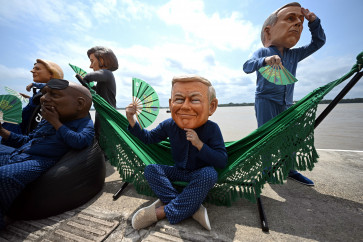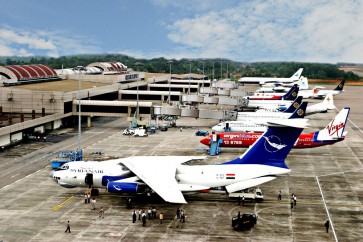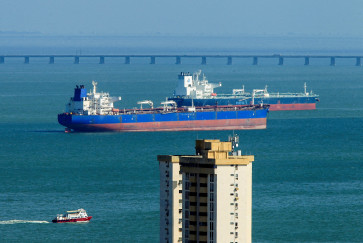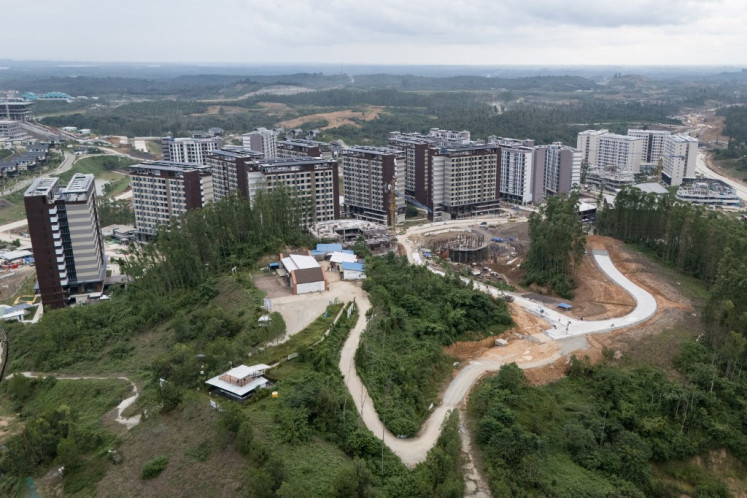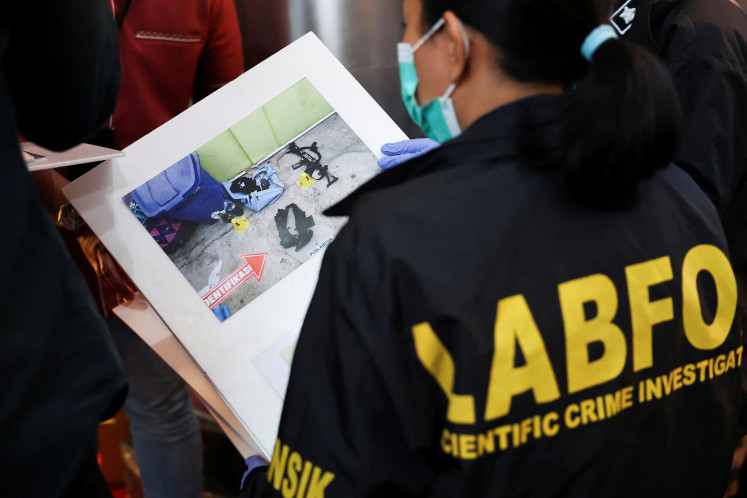Popular Reads
Top Results
Can't find what you're looking for?
View all search resultsPopular Reads
Top Results
Can't find what you're looking for?
View all search resultsIran meets North Korea, Syria in Bali
The other side: Iranian Foreign Minister Ali Akbar Salehi (center) speaks to the media at the 16th Ministerial Conference of the Non-Aligned Movement in Nusa Dua, Bali, on Thursday
Change text size
Gift Premium Articles
to Anyone
T
span class="caption" style="width: 398px;">The other side: Iranian Foreign Minister Ali Akbar Salehi (center) speaks to the media at the 16th Ministerial Conference of the Non-Aligned Movement in Nusa Dua, Bali, on Thursday. AP/Tatan Syuflana
North Korean Foreign Minister Pak Ui-chun looked confused, losing his way to the elevator after exiting the room where he had spoken with his Iranian counterpart, Ali Akbar Salehi.
Journalists chased and barraged him with questions. Finally, Iranian officials escorted him out and he escaped on the elevator.
He refused to comment on what he had discussed with Salehi. Iranian officials confirmed that the two foreign ministers held bilateral talks on a number of issues.
“All I can tell you is that they met,” Ali Pahlevani Rad, a staffer at the Iranian embassy in Jakarta, told journalists outside the meeting room. on Thursday.
Both the Iranian and North Korean foreign ministers are in Bali to attend the Non-Aligned Movement (NAM) meeting, which ends on Friday.
While both sides were tightlipped, speculation arose on
whether the two countries’ top diplomats discussed nuclear issues. When the Syrian senior diplomat later met with the Iranian minister, both were also reluctant to talk to the media.
A recent report from a UN panel of experts said North Korea appeared to have been sharing technology and expertise with Iran, violating sanctions.
Beijing blocked publication of the review, which accused Pyongyang of breaching sanctions designed to tackle its nuclear and missile programs, the Associated Press reported.
“Prohibited ballistic missile-related items are suspected to have been transferred … on regular scheduled flights of Air Koryo and Iran Air, with trans-shipment through a neighboring third country,” said the panel’s statement as quoted by The Guardian.
UN diplomats told Reuters that the third country was China. However, China subsequently denied the accusation, saying that, on the issue of denuclearization on the Korean peninsula, the Chinese position
was crystal clear: “We have nothing to hide”.
The British newspaper reported that the allegations from UN diplomats echoed a US diplomatic cable from 2007, saying China had to act “urgently” to halt a trans-shipment of ballistic missile components from North Korea to Iran via Beijing.
The memo, signed by Condoleezza Rice — then-US secretary of state — urged the US ambassador to raise the issue at the earliest opportunity and at the highest level possible. The memo was in one of the cables obtained by WikiLeaks and published by The Guardian.
The UN panel report said the implementation of sanctions needed to be improved, with North Korea becoming increasingly sophisticated in exploiting loopholes in transportation systems and using methods such as shell and front companies.
But it added, “Evidence suggests that the sanctions have succeeded in economic terms by raising the
cost of illicit transfers while simultaneously lowering the returns to the DPRK.”
North Korea has yet to respond to the report.
China is North Korea’s main ally, but does not control it and has often been left frustrated with Pyongyang. Tehran is another important partner for geo-strategic reasons as well as growing bilateral trade and China’s increasing thirst for oil.
But Beijing pledged to end civil nuclear cooperation with Iran in 1997 and has backed sanctions against both countries in recent years — albeit watering them down substantially.
Ten minutes after meeting with Pak, Syrian Vice Foreign Minister Fayssal Mekdad walked into Salehi’s room.
Reuters reported on Thursday that Western states were expected to push for Syria to be referred to the UN Security Council after UN inspectors gave independent support to US allegations that the Arab state was building a covert nuclear reactor.
In a report to member states on Tuesday, the International Atomic Energy Agency’s (IAEA) chief assessed that a site in the Syrian desert bombed to rubble by Israel was “very likely” to have been a reactor that should have been declared to the IAEA.


